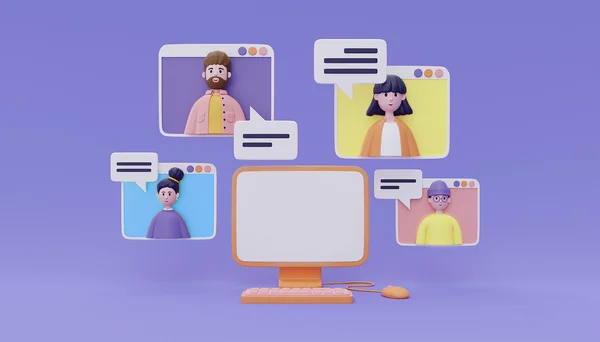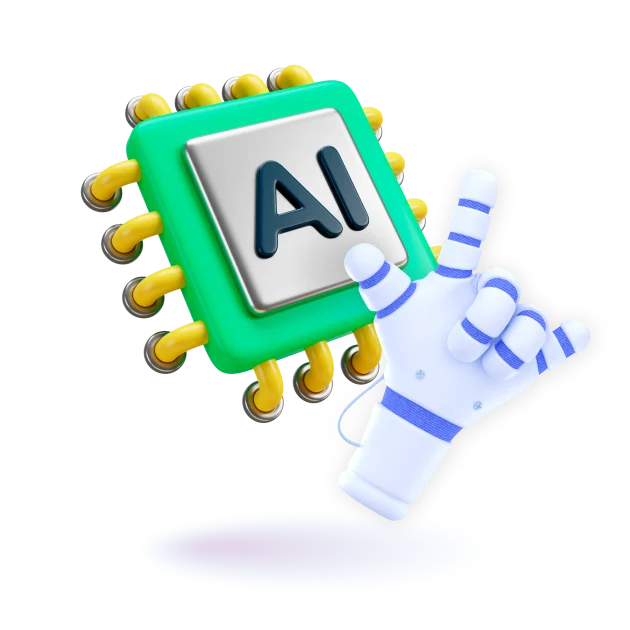The landscape of B2B lead generation is shifting, and traditional methods such as cold calling, content marketing, and PPC are giving way to more advanced and effective techniques that make use of Artificial Intelligence (AI).
As competition continues to intensify in the business world, the use of AI in B2B lead generation is no longer just an advantage, but a necessity. This article aims to explore the growing intersection of AI and B2B lead generation, including current & future applications, potential, and challenges.
Understanding Artificial Intelligence
Before we’re able to go to the deep end and immerse ourselves in the complexities of AI’s role in B2B lead generation, it is essential that we first understand what AI is and the variety of applications it has across different fields.
Artificial Intelligence refers to the simulation of human intelligence processes by machines, especially computer systems. These processes include:
- Learning (acquiring information and rules for using the information);
- Reasoning (using rules to reach approximate or definitive conclusions);
- Self-correction (learning from mistakes and making adjustments to improve future outcomes).
AI encompasses a wide range of technologies including Machine Learning (ML), Natural Language Processing (NLP), and Predictive Analytics, among others. The ones we listed are relevant in the field of B2B lead generation.
Machine Learning, a subset of AI, is the scientific study of algorithms and statistical models that computer systems use to perform tasks without explicit instruction, relying on patterns and inference instead. It enables systems to learn and improve from experience continually.
Natural Language Processing involves the interaction between computers and human language. It allows computers to understand, interpret, and generate human language in a valuable way. This technology is used in a wide array of applications including, but not limited to translation services, chatbots, and sentiment analysis. No doubt you’re familiar with and perhaps even use a natural language processing system yourself – ChatGPT.
Predictive Analytics, another tool in the AI toolbox, uses data, statistical algorithms, and machine learning techniques to identify the likelihood of future outcomes based on historical data. It is all about providing the best assessment of what will happen in the future.
With this understanding of AI and its multifaceted technologies, we can now start to explore the exciting possibilities these tools offer when applied to B2B lead generation.
The Intersection of AI and B2B Lead Generation
Artificial Intelligence has found its application in B2B lead generation in a multitude of ways. From automating processes to identifying patterns and predicting behaviors, AI and its various sub-technologies are redefining how businesses generate and qualify leads.

One of the most popular AI applications in lead generation is automation. Many businesses use AI-powered automation tools to carry out repetitive tasks such as sending out emails, scheduling follow-ups, and updating CRM data. This not only saves considerable time but also reduces the risk of human error.
Interesting Fact #1 – 91.5% of leading businesses invest in AI on an ongoing basis.
Machine Learning, with its capacity to identify patterns and make predictions, is instrumental in lead scoring. By analyzing past interactions and behaviors, ML algorithms can predict which leads are most likely to convert and rank them accordingly. This takes the guesswork out of the equation and allows sales teams to focus their efforts on the most promising leads.
Natural Language Processing is particularly useful in social media monitoring and sentiment analysis. These tools can comb through thousands of social media posts and online reviews to understand public sentiment about a product or service. It can also identify potential leads who might be interested in a business’s offerings, even if they haven’t explicitly expressed it.
One illustrative case of AI in lead generation is that of a prominent software-as-a-service (SaaS) company. This business used predictive analytics to identify which leads were most likely to convert based on historical data. By focusing their efforts on these high-quality leads, they saw a significant increase in their conversion rate.
Another example is a marketing firm that used a chatbot to automate their initial customer interactions. The chatbot could answer frequently asked questions, schedule appointments, and even qualify leads. This allowed the firm’s sales team to focus on nurturing relationships and closing deals, which ultimately led to a boost in their sales numbers.
The Benefits of AI in Lead Generation
There are numerous benefits to using AI in the lead generation process. These advantages range from transforming tedious tasks, refining targeting precision, and foreseeing future behaviors, which ultimately contribute to the success of a business’s lead generation strategy.
Increased Efficiency
Efficiency is one of the primary benefits provided by AI-powered tools in lead generation. These tools were built to automate tasks that otherwise consume valuable time. Mundane and repetitive tasks like sending out bulk emails, scheduling follow-ups, managing data entry, and updating CRM information can be effectively handled by AI. Not only can AI accomplish these tasks faster than humans, but it can also eliminate the risk of human error, thereby improving the overall quality of the work.
Furthermore, AI allows sales representatives to focus on the strategic elements of lead generation and nurturing customer relationships. For example, with AI handling initial customer interactions, sales reps can allocate their time to personally engage with leads that have shown significant interest or potential. They can prioritize building relationships, fostering trust, and closing deals, therefore enhancing the overall productivity of the sales team.
Enhanced Accuracy
Machine Learning algorithms, in particular, have the ability to sift through enormous volumes of data quickly and effectively. These algorithms can detect patterns and trends that are complex and subtle, often going unnoticed by human analysis. With this advanced level of analysis, lead scoring and targeting become more precise, ensuring that the sales team’s efforts are strategically aligned with the most promising leads.
In a B2B context, where leads often involve complex organizational structures and multiple decision-makers, the ability to accurately score leads can significantly impact the efficiency of the sales process. Machine Learning can identify leads that are not only more likely to convert but also match the Ideal Customer Profile (ICP), contributing to a more successful long-term relationship.
Predictive Capabilities
Perhaps one of the most remarkable benefits of AI is its predictive capabilities. AI algorithms can analyze past interactions, behaviors, and conversions to predict a lead’s likelihood of converting in the future. This level of foresight enables businesses to allocate their resources wisely, focusing on high-potential leads and optimizing the overall ROI.
These predictive capabilities extend to market trends and customer needs as well. AI tools can analyze market data to predict shifts in customer behavior, changes in market demand, or emerging industry trends. This means businesses can not only react to market changes but also anticipate them, staying ahead of the curve and maintaining a competitive edge.
Don’t get too excited though. As powerful as AI is in revolutionizing lead generation, it’s not without its challenges. Issues concerning data privacy and the risk of over-reliance on technology can complicate its implementation. It’s also crucial to understand that AI is a tool, not a complete solution, and it works best in combination with human insight and strategic thinking.
Challenges and Concerns With AI in Lead Generation
While AI has significantly enhanced the B2B lead generation process, reaping its benefits requires a deep understanding of the challenges it brings to the table. As businesses incorporate AI into their strategies, recognizing and navigating these challenges is paramount to achieving success.
Data Privacy
Data privacy has emerged as one of the critical concerns in the era of AI and machine learning. These technologies, despite their impressive capabilities, rely heavily on data analysis. The use of customer data in AI algorithms, though instrumental in enhancing lead generation efforts, comes with significant privacy implications.
Businesses must strictly adhere to data privacy regulations like the General Data Protection Regulation (GDPR) in Europe and the California Consumer Privacy Act (CCPA) in the U.S. These regulations lay out strict guidelines on how data should be collected, stored, processed, and used. Ignoring these guidelines could result in hefty penalties, reputational damage, and loss of customer trust.
Adhering to data privacy regulations is not just about avoiding penalties. Customers today are more conscious about their data privacy than ever before. They want to know how their data is being used and for what purpose. Being transparent about data usage can help businesses build trust with their customers, enhancing their reputation in the long run. Implementing robust data governance frameworks, regularly auditing data practices, and communicating data policies to customers are crucial steps businesses must take.
Over-Dependence on Technology
AI brings undeniable efficiencies to the lead generation process, but it is not without its limitations. One key concern is the risk of over-dependence on technology. While AI can automate mundane tasks and predict lead behavior, it cannot replicate the human touch entirely.

The process of lead generation, especially in the B2B context, relies heavily on building and nurturing relationships. These relationships are built on empathy, understanding, and trust – qualities that AI, as advanced as it is, cannot completely emulate. An over-reliance on AI can risk neglecting this human element, which could be detrimental to customer relationships.
Interesting Fact #2 – Precedence Research evaluated the AI software market size at $138.4 billion in 2022.
Therefore, AI should be seen as an enabler, not a replacement for human interaction. It should be used to automate routine tasks and provide insightful data, freeing up human resources to engage in more meaningful interactions with leads. This balanced approach will ensure that businesses harness the full potential of AI without losing the human connection.
Need for Skilled Personnel
Implementing AI technology requires specialized skills and expertise. The complexity of AI systems necessitates the need for personnel who can manage, maintain, and interpret the results generated by these systems.
Given the rapid advancement of AI technology, there is a skill gap in the market. Businesses often struggle to find professionals with the required expertise in AI. Additionally, these professionals command high salaries, adding to the overall cost of implementing AI.
Therefore, businesses must invest in training their staff to work with AI technologies. This can be done through online courses, workshops, or partnerships with educational institutions. Besides, hiring AI consultants or partnering with AI companies can also be a beneficial strategy.
Future Trends of AI in B2B Lead Generation
As we look to the future, the evolving landscape of Artificial Intelligence will continue to shape the world of B2B lead generation in exciting ways. With advancements in technology and the increasing adoption of AI in business processes, there’s no way to know for certain where things will go, especially with the idea of exponential advancements in mind, but there are several trends that are expected to shape the future of AI in lead generation.
Hyper-Personalization
Hyper-personalization, an advancement of personalization, is the process of leveraging AI and real-time data to deliver more relevant content, product, and service information to each user. With AI’s ability to analyze vast amounts of data swiftly and accurately, businesses will be able to tailor their communication to an unprecedented level of personalization.
AI algorithms can assess and learn from a potential lead’s preferences, behaviors, and interaction patterns. This enables businesses to customize every communication, marketing message, product recommendation, and service offering specifically for each lead. By making every interaction highly personalized, businesses can expect higher engagement and conversion rates.
This hyper-personalization extends beyond email communication to website experiences, content marketing, social media interactions, and even product development. In a market where customers increasingly value personalization, this level of individualized attention will provide businesses with a significant competitive advantage.
Predictive and Prescriptive Analytics
Predictive analytics is not a new phenomenon, however, the level of precision expected in the future will be a game-changer. Advanced AI algorithms will provide businesses with even more accurate predictions of customer behavior, market trends, and lead conversion likelihood.
Going a step further, prescriptive analytics will guide businesses on the next best actions to take with a lead. While predictive analytics forecasts what might happen, prescriptive analytics suggests various courses of action and shows the likely outcome of each decision. This can help businesses to make more informed decisions, optimize their lead nurturing strategy, and improve conversion rates.
Voice and Conversational AI
With the increasing popularity and acceptance of voice assistants like Siri, Alexa, and Google Assistant, voice and conversational AI are set to play an integral role in lead generation.
AI-powered chatbots are becoming more sophisticated, capable of understanding complex queries, learning from interactions, and providing a human-like conversation experience. These advancements will make the customer experience more seamless and engaging. Chatbots will not only be capable of qualifying and nurturing leads but also predicting customer queries and providing personalized responses, revolutionizing the customer service aspect of lead generation.
Interesting Fact #3 – IBM reports that using chatbots can reduce customer service costs by as much as 30%.
Moreover, with the advancements in natural language processing and understanding, voice searches and commands will become more accurate, opening new avenues for lead generation and customer interaction.
Integration of AI Tools
In the future, we are likely to see more seamless integration between various AI tools and platforms. Currently, businesses often use multiple AI tools for different aspects of lead generation – one for email automation, another for CRM, and yet another for predictive analytics.
With advancements in API technology and machine learning algorithms, these tools are expected to become more interoperable, providing a more streamlined and efficient lead generation process. This level of integration will not only make the lead generation process more efficient but also provide a more cohesive view of each lead, improving the effectiveness of personalization and predictive analytics.
3 Ways Companies Can Adapt & Prepare for the Future
As we stand on the cusp of an AI revolution in B2B lead generation, companies need to be prepared to embrace and adapt to these changes if they wish to be able to leverage the full potential of AI and gain a competitive advantage in the marketplace. Let’s take a look at some of the steps companies can take to prepare for this AI-driven future.
Invest in Training
A fundamental step in preparing for an AI-driven future is investing in AI and machine learning training for teams. Even the most advanced AI tools require human oversight, management, and interpretation. As such, it’s crucial that staff members understand how to use these tools effectively.
Companies can offer internal training sessions, encourage staff to take relevant online courses, or partner with educational institutions to provide specialized training. This investment will ensure the team has the necessary skills to manage these new technologies and maximize their benefits.
Moreover, by nurturing an AI-literate workforce, companies can foster a culture of innovation and continuous learning. This can help companies stay agile, adapting to changes in AI technology as they occur.

Gradually Incorporate AI Tools
Introducing AI tools into the lead generation process can seem daunting, however, companies don’t need to overhaul their existing systems overnight. Instead, they can start by incorporating AI tools gradually.
Starting with one or two applications can make the transition less overwhelming and more manageable.
For example, companies could begin by automating email follow-ups or using predictive analytics for lead scoring. These are relatively straightforward applications of AI that can provide immediate benefits, such as increased efficiency and more accurate lead targeting.
Over time, as the team becomes more comfortable with using AI tools, companies can expand their use of AI, incorporating more advanced tools such as AI chatbots, voice AI, and prescriptive analytics.
Track AI Developments
AI technology is rapidly evolving, with new developments and advancements occurring regularly. To stay competitive, companies must keep up with these changes and adapt their strategies accordingly.
One way to stay informed is by attending industry conferences. These events provide insights into the latest developments in AI and offer opportunities for networking with AI experts and other industry professionals.
Companies can also subscribe to relevant publications, blogs, and newsletters that focus on AI and machine learning. These sources provide regular updates on the latest research, case studies, and trends in AI. Working with an AI consultant or a technology partner can also be beneficial. These experts can provide personalized advice and recommendations based on the specific needs and goals of the company.
To summarize the points above, by investing in training, gradually incorporating AI tools, and staying aware of AI-related industry developments, companies can ensure they are well-prepared to navigate this new landscape successfully. Embracing AI is no longer a choice but a necessity for businesses looking to thrive in this evolving digital landscape.
Conclusion
Artificial Intelligence is no longer a futuristic concept but a present-day reality. Its impact on B2B lead generation is immense, offering opportunities for increased efficiency, enhanced accuracy, and advanced predictive capabilities. However, businesses must be mindful of the challenges AI brings, especially regarding data privacy and over-reliance on technology.
By staying informed about AI advancements, investing in training, and gradually incorporating AI tools into their strategies, companies can ride the wave of this AI revolution. Indeed, the future of B2B lead generation lies in the smart integration of human intelligence & artificial intelligence, and building your internal business processes in a way that the two work in symbiosis.
With the relentless advancements of AI, one thing is certain – the companies that embrace these technologies today will be the industry leaders of tomorrow.





